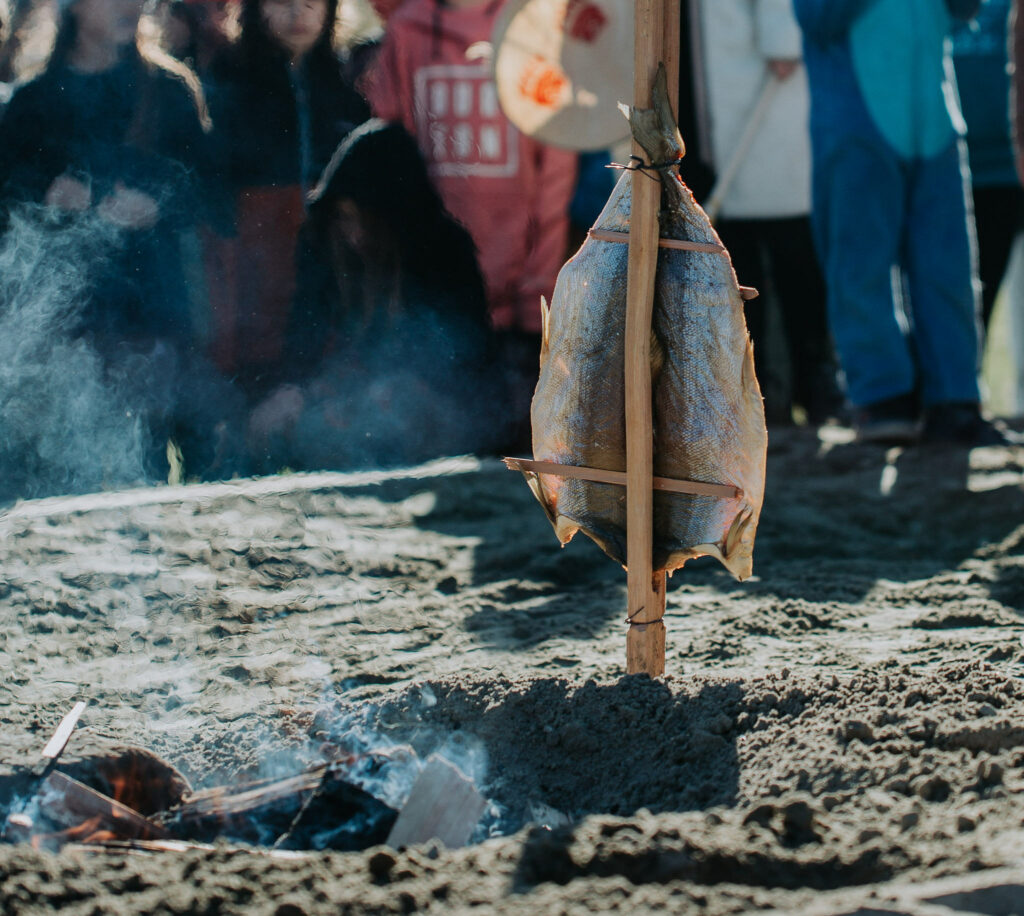Líl’wat Knowledge Keeper Lakál’t Tanina Williams sat close to the fire in the Signal Hill Elementary School sandpit as the moon rose behind the mountain. The hardwood in the pit would take several hours to burn down to the coals needed for the next day’s harvest feast. A Hail Mary request on Facebook for battery-powered spotlights had failed, so only the dance of flames and a few small camping lamps lit the all-night vigil.
The Signal Hill pit cook turns the ideals and work of reconciliation into a tangible event, connecting each of the school’s 425 students with the land on which they live and with an age-old technique for cooking large amounts of food. The outdoor ceremony gathers the entire community together — students, staff, parents — under the eye of Ts’zil (Mount Currie) to eat vegetables grown by the students and salmon slow-cooked in an underground pit fire.
Lakál’t and her support team prepared the fire, turning the two-square-metre pit into an earthen pressure cooker. Later, they loaded in foil trays of covered potatoes, carrots and squash, topped with a layer of bushes. They sealed the pit with a canvas tarp and a layer of sand, then lit another fire on top.
Stoking flames in firepits might seem like a risky move for an elementary school, but it demonstrates the change underway as Signal Hill aims to learn from Líl’wat principles and values. The school operates on unceded Líl’wat territory and serves a mixed community of students. But Líl’wat worldviews don’t easily fit into non-Indigenous spaces. Lakál’t has devoted her life to carving out space for her culture and creating ways for Indigenous and non-Indigenous people to learn alongside each other.
At 8:30 a.m., when the kids started to arrive at school, Lakál’t drove herself and the Firekeeper home, leaving the next stage of the pit cook in the hands of the school’s principal, the parent volunteers and her Indigenous colleagues starting their day. Her health kept her from staying throughout the process, but this year, she knew she could count on the team. “We’d made all the mistakes before.”
“Everyone needs to sit around a fire,” the Cultural Chief for the Líl’wat Nation, Ku̓kwpi7 Gélpcal Joseph, said after the previous year’s event. “The safety, the comfort you feel — there’s so much that comes out in people.” On the next professional development day, Signal Hill principal Krista Brynjolfson ushered her staff out of classrooms to unfold camp chairs and spend the day fireside.
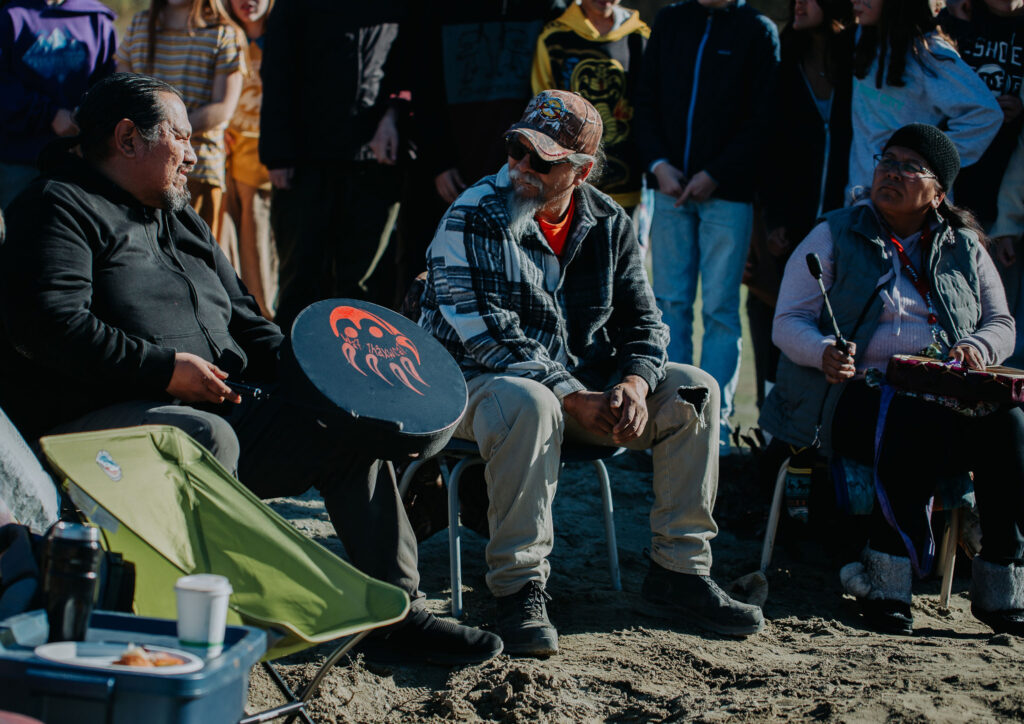
Slow Burn
As an Indigenous support worker for the school district, Lakál’t provides cultural support for the school’s Indigenous students as they navigate the mainstream education system. She has introduced weaving, plank drums and making ribbon skirts to the school. One day, she hopes to get students to make a traditional Líl’wat dugout cedar canoe. Lakál’t half-jokes that the pit cook was her plan to ease the school into letting kids work with fire, a necessary element in canoe-making.
Ambitious schoolwide projects and the recentring of traditional skills require Lakál’t to play a long game and grow as she goes. They require effort to source fragments of the language and unearth details of practices devastated by colonial policies. “Our Elders and Knowledge Keepers are stretched thin,” she says. “For me to do anything, I need to take workshops, listen to stories, do research.”
Residential schools disconnected three and four generations of families from their cultures, part of a long-running genocidal Canadian policy that quashed Indigenous languages and displaced ways of knowing and being. Capacity-building, as Lakál’t calls it, takes time. Colonization didn’t happen overnight. Decolonization and cultural revitalization won’t either.
To bring ideas to life, Lakál’t needs allies and supporters willing to roll up their sleeves and learn alongside her. “Once I feel confident in what I’ve heard, I need to trust the knowledge I’ve gathered and then do it,” she says. “It means I’m often learning alongside the kids and the teachers. It’s fun, because we’re all on an equal footing, learning as we go.”
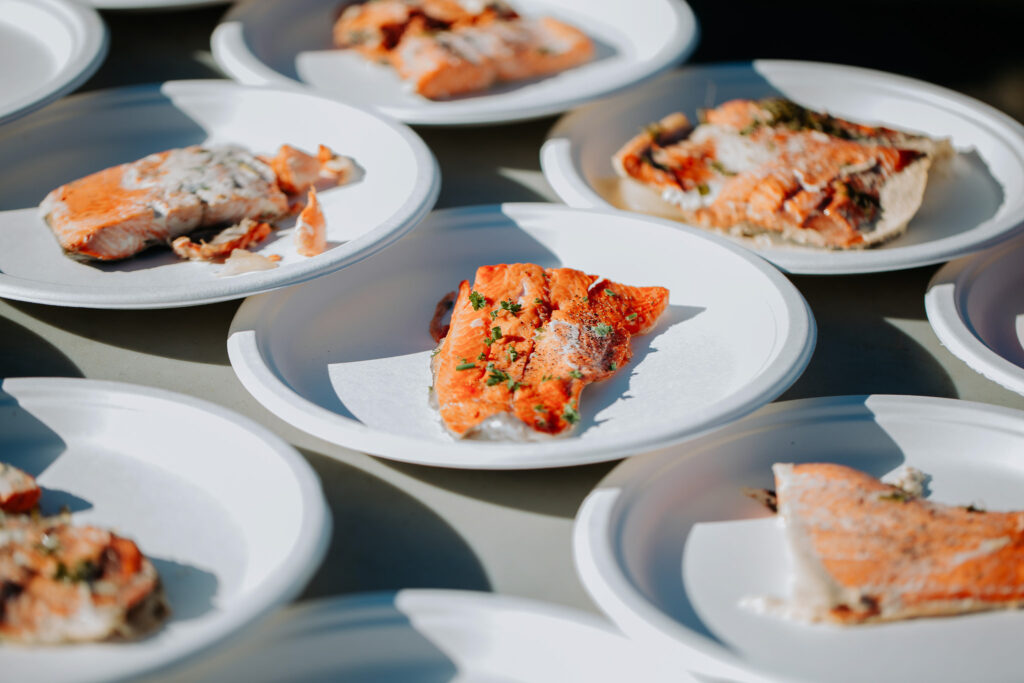
Last Year’s Leftovers
As a pastry chef, acclaimed wedding cake artist and former restaurateur, parent volunteer Lisa Vertefeuille had cooked in plenty of high-pressure situations, but never in an earth pit — until she volunteered for last year’s event. Eager for a new food adventure, she dug in alongside Lakál’t and the crew.
Deep in the logistics of baking vegetables in the ground, sleep deprived and up against the ticking clock of the school day, they took some wrong turns. Wanting the kids to see the process unfold, they waited until school started to load the vegetables into the pit. Against the advice of Lakál’t, the crew built the salmon-smoking fire away from the pit, instead of on top of it, where it could add heat from above to the pit oven. The resulting half-cooked vegetables had to be speed-shuttled from the field into kitchen ovens to finish cooking.
Vertefeuille often builds a schedule and action list as people are talking, a habit formed during years of running kitchens. “I’ve already thought about the logistics of how something is going to work.” With 500 people to feed, it was hard to reconcile her deadlines with Lakál’t’s advice: “Sometimes it’s not going to work out the way you want,” the Knowledge Keeper had said. “Sometimes timelines are not going to be met.”
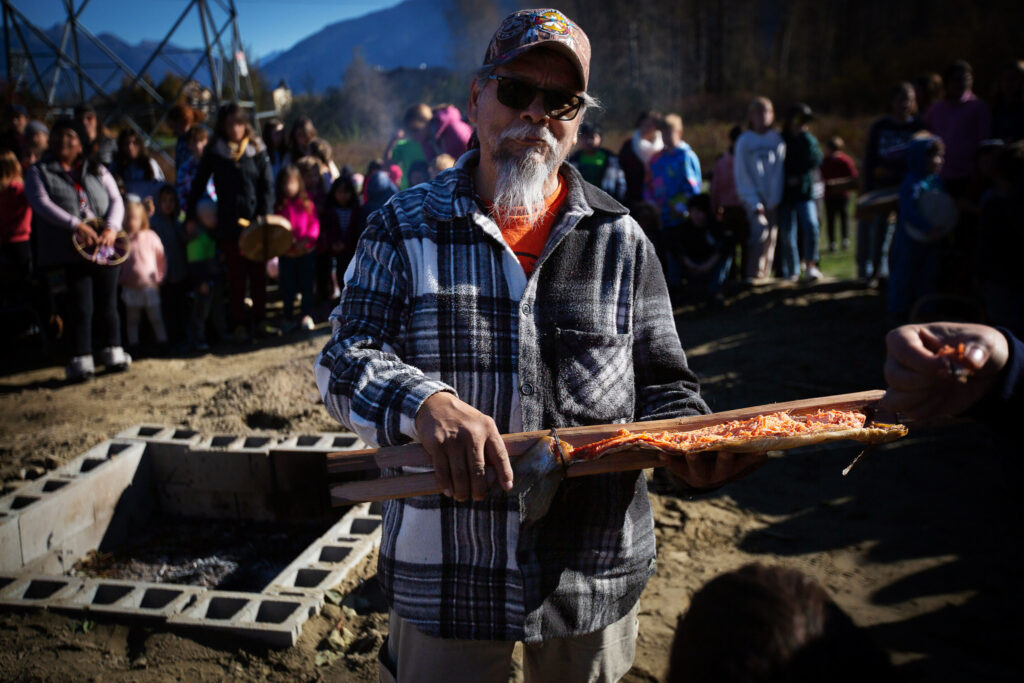
The Unlearning Process
Since the release of the Truth and Reconciliation Commission report in 2015, Canadians have grappled with how to respond to the revelations of unmarked graves and the legacy of the residential school system. Indigenous people have been grappling with the impacts for much longer. Schools such as Signal Hill are realizing their new imperative: to be spaces for healing instead of harm.
When Vertefeuille’s daughters first told her they were learning the Ucwalmícwts language, she didn’t understand the value. “When are they going to use that?” she wondered.
Then she heard Líl’wat Elders share their first-hand experiences of surviving residential school, and something massive shifted inside her. “I can’t believe how I used to feel. I had all these biases growing up,” she says. Hearing those testimonies, she understood that language was an entryway into culture. She hopes her children do not grow up with those misconceptions, but to prevent that, she must work to undo her own.
When the pit cook crew debriefed after the first schoolwide ceremony last year, Lakál’t prefaced her feedback with five words: “I say this with love.” Then she told her non-Indigenous teammates plainly that they were wrong to veto guidance from her and the Firekeeper. They had not respected the leadership the Lil’wat7ul provided.
Lakál’t recognized the resistance to trusting Indigenous wisdom and tradition. For her entire life, she has battled the presumption that Indigenous ways and Indigenous people are second-rate. “We know this stuff. It’s in our genes,” she says. “We’ve all done pit cooks in our ancestry, but because non-Indigenous people are a lot further disconnected from their ancestry, they struggle with trusting that it will work.”
This year, they knew better.
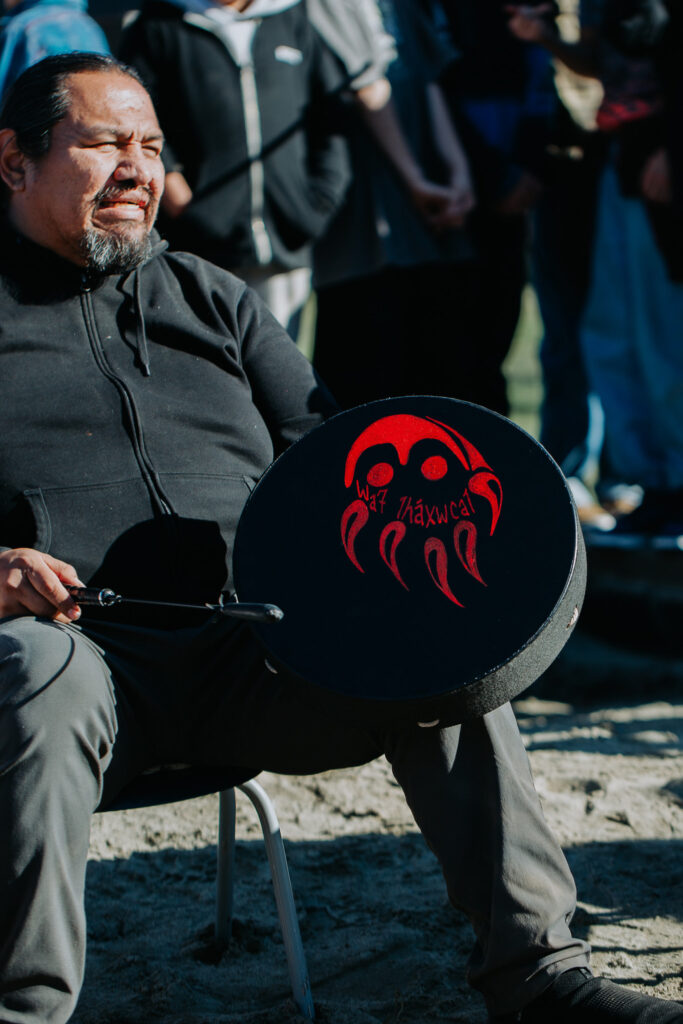
Standing on Ceremony
As the bus driver and a groundskeeper at Signal Hill, Barry Dan does the kind of behind-the-scenes work that few students know about. He spent the day of the pit cook by the fire, chatting and visiting with Líl’wat leaders when things were calm, jumping up to help when needed. The sand bubbled and burped like liquid when Dan shovelled away the top layer. At recess, students gravitated to the fire like supercharged magnets. He kept a gentle watch. “Any ceremony is good for the kids,” he says. “It’s good for anybody that wants to learn.”
Dan was drawn towards ceremony as a teenager, and to a handful of men in his community who held the culture. Always the youngest, he sometimes wondered what he was doing with the men he called “Uncle” as a show of respect, instead of hanging out with other teenagers.
He hadn’t grown up with a strong sense of his Indigenous culture. His family members were skilled with horses, he says. “We were like cowboys. I never thought of myself as Native or Indian.” He’d often hear his neighbours singing. “They were the culture ones.”
After the feast had been unearthed, the pit was covered with sand, and a central fire roared on top. Dan shared words with the students, staff and families who slowly massed around the firepit — people from the wide-ranging ancestries that make up present-day Pemberton: St’at’imc, Mexican, German, British, Australian, Japanese and more. He invited them all to take a moment before eating to acknowledge the ancestors, to acknowledge all the beings that came before.
“Be thankful for whatever you have in front of you, for all the food that you get,” he said. “From all the groups: the four-footed ones, the winged ones, the insect ones, the reptiles, the rooted ones. We get all our food from everything. They give of themselves willingly. No questions asked. For us to live.”
He made an offering to the fire. The salmon that had been splayed on a stick and smoked over the fire on top of the pit was passed around. Dan’s sister, Leah, explained that the Líl’wat custom is for people to take a small piece of this first ceremonial salmon. The plate moved through the crowd of students, small fingers pinching little pieces of salmon flesh.
If even one of the people present heard his words, understood the message or took the lesson home, Dan considers his job done. “Now I’ve passed it on to someone. One of them out of the five hundred. If none of them got it, then the opportunity comes again, I’ll say it again and maybe they’ll get it the second time.”
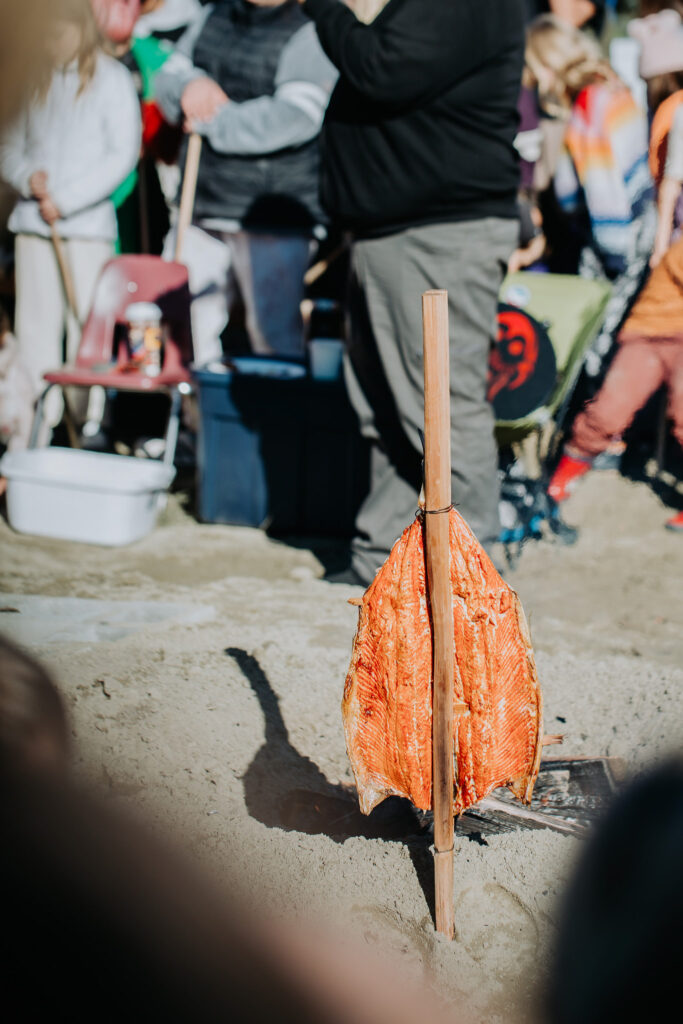
When Lessons Land
Last year, the crew raced to get the kitchen ovens hot, dig out the half-raw vegetables and finish cooking them. This year, they built a right-sized pit with concrete blocks. The earth became a furnace, cooking the fish and vegetables just as intended. The harvest directly from this land fed everyone.
Despite their missteps, nobody considers the first pit cook a failure. The ambitious prototype for a schoolwide harvest celebration opened up opportunities for the school, including the use of the fire as a gathering space — the principal decided to keep it on as a permanent fixture.
No single person can tackle the work of reconciliation and relationship-building. Lakál’t needs allies willing to step up and step out of their comfort zones, willing to be corrected when they make mistakes and grow their relationship to place and the people of the place. The reward — experiencing Indigenous ways of knowing and being — radically nourishes all involved.
Vertefeuille came to the project as the garden coordinator. “I was really yearning for some way to be involved in my community and be of service.” She expected to use her professional expertise to guide kids through lasagna gardening, building mason beehives and making wildflower seed bombs. In the pit cook, she found the opportunity to expand her thinking, her knowledge and her community.
“When Indigenous people work together, we work hard, but ultimately it’s about connection,” Lakál’t explains. Everyone was Indigenous once. “It heals our genes to say, ‘Oh, I remember this.’ We all need healing. Because colonization has damaged us all.”
Back in the kitchen, checking cleanup tasks off her list, Vertefeuille heard the drumming continue under the bluebird sky. She remembered Lakál’t’s words: “Sometimes, you just need to chill out.” Being in community and sharing the experience mattered as much as the outcome. Sixteen hours after she started her shift in the smoky darkness, Vertefeuille pulled off her apron and returned to the fire.

